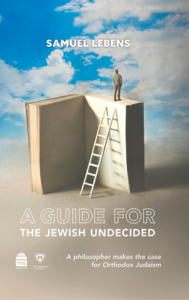By Rabbi Dr. Israel Drazin

BOCA RATON, Florida — Maggid Books, together with Yeshiva University Press, published “A Guide for the Jewish Undecided: A Philosopher Makes a Case for Orthodox Judaism” by Dr. Samuel Lebens, a rabbi and Orthodox Jew who is an associate professor of philosophy at the University of Haifa in Israel. His other books are “The Principles of Judaism” (2020) and “Philosophy of Religion: The Basics (2022).” He was a co-founder of the Association for the Philosophy of Judaism. While the book deals with issues of philosophy, it is very easy to read and understand.
In his foreword, Dr. Daniel Rynhold, Dean and Professor of Jewish Philosophy at Yeshiva University, states that Dr. Lebens’ book is a significant contribution to contemporary Jewish thought because he shows the rationality of the Jewish religion by using the tools of analytic philosophy. He adds that Lebens gives good reasons for Jews to commit to Orthodox Judaism because Orthodox Judaism “makes the most rational sense.” Readers of Dr. Lebens’ book will find themselves agreeing with many of Lebens’ ideas and being interested even in those they disagree with because they will find them to provoke their thinking.
While true, some of what Dr. Lebens states may surprise some readers. For example, he describes the different approaches the New Testament took of Paul’s acceptance of Jesus and the Midrashic depiction of Ruth converting to Judaism. In the New Testament Acts 9, Paul accepts Jesus because Jesus appeared to him when he traveled to Damascus and filled him with the Holy Spirit. While the book Ruth in the Hebrew Bible does not say Ruth converted to Judaism, ancient Midrashim describe her converting to be a Jew. Her conversation with her mother-in-law Naomi is given in detail in the Midrashim. She never says she believes God exists. Even when she says, “Your God is my God,” she is referring to Jewish practices. In essence, Ruth said, “I want to become one of your people.” Even today, it may surprise some readers that converts to Judaism do not need to say they believe in the existence of God. Furthermore, they do not even have to promise to observe all the Jewish commandments.
 It may also surprise readers that although Orthodox Jews have accepted the Orthodox title applied to them by others, a word meaning a commitment to specific opinions or beliefs. Orthodox Jews are Orthoprax, accepting certain practices and behaviors. Indeed, the Torah does not demand beliefs but the observance of prescribed practices.
It may also surprise readers that although Orthodox Jews have accepted the Orthodox title applied to them by others, a word meaning a commitment to specific opinions or beliefs. Orthodox Jews are Orthoprax, accepting certain practices and behaviors. Indeed, the Torah does not demand beliefs but the observance of prescribed practices.
Lebens concedes, as does Maimonides (1138-1204), that we cannot prove the existence of God. But this does not mean we cannot argue that one might have good reasons to believe in God’s existence. The two and many others see the Torah itself saying we cannot know anything about God. This occurs in Exodus 33 when Moses requests God to tell him about God. God replies that humans cannot understand God but can see what God has created.
Nevertheless, Lebens offers some ideas that may persuade some people that God exists. Among others is the testimony of many people who have experienced God’s presence. There is also the famous argument by the poet Yehuda Halevi (circa 1075-1141) that the Israelites experienced God at Sinai and told their children about it. Their children told their children until the present time. Thus, according to Halevi, we have the testimony of God’s existence. Lebens is not impressed with this notion. He gives about two dozen other arguments for the existence of God.
Lebens also discusses other related items, such as whether the revelation at Mount Sinai, which many Jews consider the basis of Judaism, actually happened. Interestingly, there are many vastly different ideas among rabbis in the Talmud and Midrashim about what actually occurred at Sinai. He also talks about the Frenchman Blaise Pascal’s (1623-1662) famous notion that believing in God is a good bet. He points out the irrationality of his notion and offers in its place what he considers a beneficial bet to accept Jewish practices. In his appendix, Lebens also discusses a recent disturbing development regarding conversion to Judaism.
In short, readers will find Lebens’ book interesting, thoughtful, and enlightening.